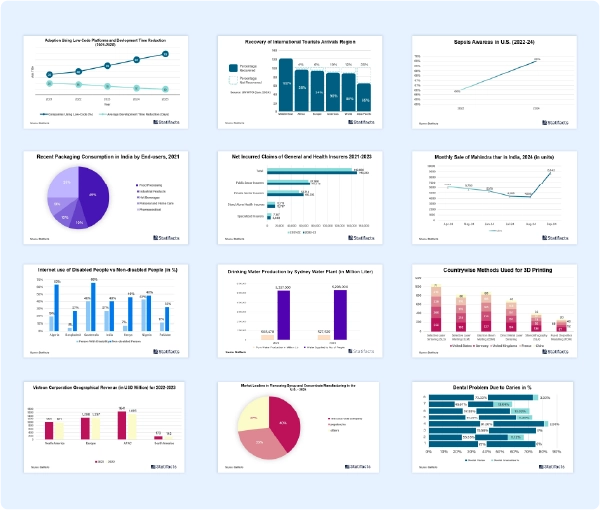The U.S. medical billing outsourcing market size accounted for USD 6,300 million in 2024 and is expected to exceed around USD 19,920 million by 2034, growing at a CAGR of 12.2% from 2025 to 2034.
U.S. Medical Billing Outsourcing Market Report Highlights
- By component, the outsourced medical billing dominated the market in 2024.
- By component, the in-house segment is set to experience the fastest rate of market growth from 2025 to 2034.
- By service, the front-end services segment maintained a leading position in the market in 2024.
- By service, the middle-end services segment is anticipated to grow with the highest CAGR in the market during the studied years.
- By end-use, the hospital segment captured a significant portion of the market in 2024.
- By end-use, the physician office segment is predicted to witness significant growth in the market over the forecast period.
The U.S. medical billing outsourcing market involves hiring third-party companies to manage billing processes for healthcare providers which includes tasks such as claim submissions, payment tracking, and compliance with regulations. Outsourcing helps streamline operations, reduce costs, and improve revenue cycle management allowing providers to focus on patient care and also provide access to specialized expertise and technology. Over the years, medical billing service outsourcing in the U.S. has grown remarkably due to ever-increasing demand to simplify the billing process and manage the revenue cycle within the healthcare industry. Medical billing service outsourcing has become a feasible solution for healthcare providers seeking to reduce billing errors, improve compliance, and increase the speed of revenue collection.
Industry Valuation and Growth Rate Projection
| Industry Worth |
Details |
| Market Size in 2024 |
USD 6,300 Million |
| Market Size in 2025 |
USD 7,070 Million |
| Market Size by 2034 |
USD 19,920 Million |
| Market Growth Rate from 2025 to 2034 |
CAGR of 12.2% |
The key factors that continue to shape the market dynamics of U.S. medical billing outsourcing market include the growing intensification of complexity in the field of medical billing codes, increased stringency in healthcare regulations, and the need for affordable billing solutions. Outsourcing medical billing services can help healthcare service providers maintain the required compliances, ensure timely payment, and hopefully reduce administrative costs for everything from the smallest practices to large hospitals. The segmentation in medical billing outsourcing market is categorized into front-end services, back-end services, and complete billing solutions. Of these specifically, front-end services and complete billing solutions can be expected to retain considerable shares, driven by efficiency and accuracy provided through outsourced billing software.
The U.S. medical billing outsourcing market is significantly influenced by the increasing complexity of healthcare regulations, where providers must comply with numerous billing requirements, including updates to coding systems like ICD-10 and ongoing adherence to HIPAA. Outsourcing these tasks helps reduce errors and ensures compliance, making it a preferred option for healthcare providers. This complexity drives demand for specialized billing services that can navigate these regulations efficiently.
The rising healthcare costs and the administrative burden associated with in-house billing processes are major drivers of the market. Outsourcing medical billing reduces costs and administrative workload which allows healthcare providers to focus on patient care while improving operational efficiencies. This shift helps manage hospital operations more effectively and enhances financial outcomes by streamlining complex billing processes.
Another growth factor includes advancements in technology, which include the integration of AI, machine learning, and automation, transforming the medical billing outsourcing landscape. These innovations enhance billing accuracy, efficiency, and speed, making outsourced services more appealing to healthcare providers. The use of advanced billing software and electronic health records (EHRs) further supports this trend by minimizing manual errors and improving data accuracy.
One of the major concerns is over Data Security and Patient Privacy, where outsourcing involves sharing confidential patient information with third-party providers and health facilities are deeply concerned about the potential leakage of data and the complicated compliance issues regarding privacy legislation such as HIPAA. This may potentially hamper the growth in the medical billing outsourcing market as providers will not be especially willing to outsource strategic activities in medical billing for fear of unauthorized access to sensitive information about patients' personal and medical history. Also, setting in place robust cybersecurity and compliance protocols is what outsourcing firms can do to blunt these risks, bridge the chasm of distrust, and win over healthcare organizations.
AI is dominating every market currently, and it is driving growth in the U.S. medical billing outsourcing market by enhancing efficiency, accuracy, and compliance. It automates tasks like claims processing and coding, which reduces errors and denied claims. AI's predictive analytics help forecast revenue trends, allowing providers to adjust strategies proactively. Additionally, AI improves fraud detection and streamlines workflows, leading to smoother revenue cycles and so this automation also enables healthcare providers to focus more on patient care. Overall, AI integration boosts operational efficiency and financial stability in the sector.
Future growth opportunities in the U.S. medical billing outsourcing market are driven by increasing healthcare complexities, technological advancements, and a growing preference for outsourcing administrative tasks. The market benefits from advancements in billing software and electronic health records, which enhance efficiency and accuracy. Additionally, the need for regulatory compliance and cost-effective solutions fuels the demand for outsourced services. As healthcare providers focus on patient care, they increasingly rely on third-party billing services to manage their revenue cycles effectively.
Published by
Laxmi Narayan , February 2025

